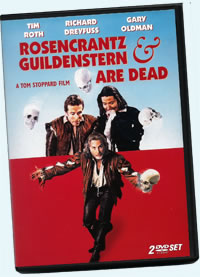Rosencrantz and Guildenstern Are Dead
A Sideways Depiction of Hamlet
Cinecom Entertainment (1991), Image Entertainment (2005)
Directed by Tom Stoppard. With Gary Oldman, Tim Roth, Richard Dreyfuss, Iain Glen, Donald Sumpter, Joanna Miles, Ian Richardson.
 Tom Stoppard's play Rosencrantz and Guildenstern Are Dead, written in 1966, is considered a “modern classic” in the cultural lexicon. However, three years ago was the first time I saw the play when the American Shakespeare Center’s touring company combined it with Hamlet in its repertoire. I got a kick out of its cross-cutting scenes with Hamlet, but, overall, my initial response to this play was a big huh?
Tom Stoppard's play Rosencrantz and Guildenstern Are Dead, written in 1966, is considered a “modern classic” in the cultural lexicon. However, three years ago was the first time I saw the play when the American Shakespeare Center’s touring company combined it with Hamlet in its repertoire. I got a kick out of its cross-cutting scenes with Hamlet, but, overall, my initial response to this play was a big huh?
We already had (but never had watched) the Stoppard-directed film version in our Shakespeare library. So, on a recent weekend evening, we removed the shrinkwrap from the DVD, filled up our wine goblets, set out a cheese buffet, and girded ourselves for a night of existential verbosity. Well, the movie turned out to be the best part of the next two hours. The wine was decent and the cheese quite good, but Rosencrantz and Guildenstern Are Dead was the worthiest treat.
I won’t fault ASC’s take on the play; I seldom see that company misfire on any play, so I must conclude they took a good shot at this one. Rather, the movie has to its advantage one thing the stage play does not have: while both have Stoppard as playwright/screenwriter, the film version also has Stoppard the director and editor, one who was more than willing to hack at his own composition. Clocking in at just under two hours, the movie’s script is much tighter than the stage play's, the characters' interplay comes across as much sharper, and the plot is more concise.
In an interview with Stoppard, one of the extras on this two-DVD set, the playwright opines that he was the best person equipped to adapt and direct his play not because he would treat his work as sacrosanct but because other directors might. He not only was willing to take a fresh approach to his then-25-year-old material, he desired to do so. The movie still has a surreal feel to it and an absurdist quality, but it nevertheless has a clearer storyline that may be closer to Stoppard’s original intent with the play: to tell the story of Rosencrantz and Guildenstern through their eyes rather than Hamlet’s. How did these guys come to Elsinore, what was their interaction with the players, how did they regard their “ex'llent good friend” Hamlet, and did they willingly accept their mission to accompany Hamlet to England? Finally, how did they feel about their ultimate fate? Hamlet didn’t consider them innocent bystanders in his deadly game with his Uncle Claudius, but would Rosencrantz and Guildenstern agree? Or, as Richard Dreyfuss says in his interview on the DVD, were they just schmoes carried along on the tide of court intrigue they never comprehended. In the end they are left to ask, “How did this happen to us?” That, in essence, is the question Stoppard’s play poses.
When I saw the play, I came to the conclusion that the duo already were dead, and what we were witnessing—especially in their philosophical interactions with The Player—was a post-death dream state. The movie, via some impressionistic scenes in passing, hints that it is happening in the present tense as dictated by the titular line taken from Hamlet—Rosencrantz and Guildenstern are dead. However, the film follows a clear timeline that takes you from the duo’s traveling to Elsinore, meeting the players, arriving in Elsinore, interacting with king and queen and then Hamlet, taking to sea, and finally ending up on the gallows. So, even if you don’t fully understand the existentialism explored here, you can sit back and enjoy a good yarn that weaves in and out of Hamlet’s plot.
You will also enjoy, immeasurably, the performances. Gary Oldman and Tim Roth, respectively as the title characters, here give solid evidence of their impressive careers to come. Roth’s Guildenstern is the more cynical and practical of the two, barely maintaining his patience with his friend and always trying to make sense of Hamlet and the other weirdness they keep encountering. Oldman’s Rosencrantz is a laid-back boy-man of wonder. The weirdness he experiences—like the coins always coming up heads when flipped, and the surreal sea battle with the pirates—he accepts as oddities to observe rather than circumstances to control (whereas Guildenstern actually takes sword in hand when the ship is attacked). Rosencrantz constantly makes great discoveries of physics, only to have his discoveries instantly disproved when he displays them to Guildenstern. It’s a running joke that maintains its legs throughout the play on the strength of Oldman’s ever-puzzled persona.
These two also have to handle Stoppard’s sometimes obtuse dialogue plus engage in Shakespearean dialogue with Hamlet and Claudius, and they manage this demanding task expertly. Their question-and-answer game, played as if they were playing tennis on a court, is worth a replay on your DVD, and if you understand the game, apply it to their first conversation with Hamlet to get in on one of Stoppard’s most brilliant jokes (I think; I haven’t completely figured it out yet so I’m not fully privy to what’s going on there).
Richard Dreyfuss plays The Player, and you may not recognize him. Not just physically, either. Dreyfuss is an Oscar-winning actor and he’s got some memorable performances to his credit, but this one is beyond Oscar-worthy, beyond Tony-worthy. He carves out a personality that is always on stage, even when he is in private conversation; he doesn’t merely speak his lines, he performs them, syllable by syllable, with a mingling of apparent ego and obtuse wisdom. His character has the play’s key line: "Audiences know what they expect and that is all they are prepared to believe in." Thanks to Dreyfuss delivering that line, its importance slices into your subconscious and helps you frame the action that follows.
Iain Glen’s portrayal of Hamlet is troubling. He’s kind of a sniveling weasel, but he also comes across as clearly mad. As this portrayal is under Stoppard’s direction, is that the playwright's take on the character Shakespeare wrote? Meanwhile, for those of you looking for fine Shakespearean performances, this movie offers up Ian Richardson as Polonius. Richardson is a longtime veteran stage actor and member of the Royal Shakespeare Company, and though this Polonius is traditionally rendered (he’s dressed as Lord Cecil in Queen Elizabeth’s court), Richardson gives subtle expressions and intonations that offer up a good study in this character’s relationship with the lord Hamlet.
Rosencrantz and Guildenstern Are Dead is the only movie Stoppard ever directed. While I’m not a disciple of him as playwright yet, I’ll jump on his directing bandwagon on this outing alone. Filmed in Croatia, the movie takes advantage of a sparse landscape to drive home the play’s existentialistic qualities, and Stoppard confidently captures a visual signature for the play’s action. He doesn’t shy from surreal setting and absurdist edits, and if that troubles your logical bearing, at least the visual context carries along the dialogue much better than a bare stage with no props does.
In the 2005 two-DVD set, the second disc contains interviews with Stoppard, Oldman, Roth, and Dreyfuss. Filmed long after the movie was made, the interviewees rely on foggy memories, and more time is spent on talking about their careers than on this particular film. But you do learn that Roth and Oldman so enjoyed playing these parts they rehearsed scenes over and over just for the fun of it—even rehearsing scenes that had already been shot. And if, like me, you feel you haven't totally intellectually grasped the play or movie, you'll find a kindred spirit in Dreyfuss—he hasn't a clue what Stoppard's script is really about, either.
So, even if the play Rosencrantz and Guildenstern Are Dead is an acquired taste that may or may not prove a classic, the movie Rosencrantz and Guildenstern Are Dead is a worthy addition to any Shakespearean film library and an intellectually delightful way to spend an evening, wine and cheese optional.
Eric Minton
July 13, 2012
Comment: e-mail editorial@shakespeareances.com
Start a discussion in the Bardroom



 Find additional Shakespeareances
Find additional Shakespeareances